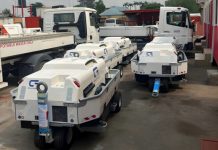The Institute of Safety Professionals of Nigeria (ISPON), Lagos State chapter, has stressed the importance of safety standards to the growth of the aviation industry.
The Chairman of ISPON Lagos Branch, Mr Olusola Ogunleye, made the call during a media interactive session held in Lagos.
The News Agency of Nigeria (NAN) reports that the session commemorated the International Labour Organisation (ILO) World Safety Day.
The 2025 ILO World Safety Day is with the theme: ‘Revolutionising Health and Safety: The Role of AI and Digitalisation at Work’.
According to Ogunleye, the aviation industry focuses not only on passenger traffic, but on ensuring safe take-offs and landings, maintaining its status as the safest transport mode.
He noted: “In 2014, ISPON reviewed its training portfolio to introduce a new course called ‘Aviation Safety.’ This model is performing well.”
Ogunleye revealed that, within a few months, the ISPON Aviation Charter would be inaugurated to strengthen aviation safety initiatives further.
“We understand Nigeria can no longer stand on the fence regarding safety,” Ogunleye said.
He added that ISPON is collaborating with agencies such as the Nigeria Civil Aviation Authority and Federal Airports Authority of Nigeria to establish health and safety desks.
Ogunleye stated that FAAN already has a desk, with plans underway for wider adoption across aviation agencies.
“Very soon, all safety personnel must be certified by ISPON; Air Peace, Green Africa, and Sahara Aviation have already signed up,” he said.
Speaking on the 2025 ILO theme, Ogunleye highlighted that artificial intelligence (AI) is now a transformative force in workplace innovation.
He said: “AI-powered systems can predict hazards before they occur, allowing proactive measures to prevent accidents.”
He explained that machines now analyse patterns in real-time, detecting risks unseen by the human eye.
“Wearable devices monitor workers’ vitals, alerting supervisors to signs of fatigue or stress to prevent health crises,” he added.
Digitalisation, Ogunleye said, further enhances these capabilities by equipping workplaces with Internet of Things (IoT) technology.
“Smart workplaces now track environmental conditions like air quality, temperature, and noise levels, ensuring safer environments,” Ogunleye explained.
He added that digital training platforms offer immersive simulations, preparing workers for high-risk scenarios without actual exposure to danger.
Ogunleye noted the major benefits of AI and digitalisation as reduced incidents, enhanced efficiency, and, most importantly, saving lives.
However, he cautioned that AI integration must prioritise ethical considerations, data privacy, and ensure inclusivity for all workers.
He called for collaboration across industries, government, and institutions, emphasising ISPON’s readiness to partner with relevant agencies.
Ogunleye also urged the government to invest more in technology and infrastructure to promote workplace safety and innovation.
NAN













